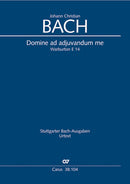| 作曲者 | Johann Christian Bach (1735-1782)・ヨハン・クリスティアン・バッハ |
| タイトル | Domine ad adjuvandum me, Warb E 14 (Score) |
| サブタイトル | Responsorium |
| 出版社 | Carus・カールス |
| シリーズ名 | Stuttgart Bach Edition |
| 楽器編成 | 混声合唱 |
| 楽器編成(詳細) | Soli SA,Coro SATB,2 Ob,2 Cor,2 Violins,Viola,Basso continuo |
| 品番 | M007144050 |
| 校訂者 | Guido Erdmann |
| 難易度 | 中級 |
| 言語 | ラテン語 |
| 形状 | 24 ページ・21 x 29.7 cm・110 g・ソフトカバー |
| 演奏時間 | 5分 |
| 出版年 | 2014年 |
| 出版番号 | CV 38.104/00 |
| ISMN | 979-0-007-14405-0 |
| サンプル | https://www.carusmedia.com/images-intern/medien/30/3810400/3810400x.pdf |
At the age of just 20, Johann Christian Bach, the youngest son of Johann Sebastian Bach, the Kantor of St. Thomas’s, left behind the Lutheran musical tradition of his family: he went to Italy, converted to Catholicism there and successfully composed operas for Turin, Milan and Naples. Frequently overlooked are the Catholic Bach’s exquisite church music works, almost all written in the years 1757–1760, and which had a significant influence on his time in Italy. These include large-scale Vesper settings with impressive, symphonic-style instrumental introductions, sometimes anticipating Mozartian idioms. Bach’s Domine ad adjuvandum me, an immediately captivating work, was written for the opening of Vespers, it seems to be carried along by a sense of euphoric purpose and a dynamic lightheartedness which positively radiates southern European temperament. The work is published in the authoritative Stuttgart Urtext edition, based on the rediscovered Hamburg autograph manuscript.



